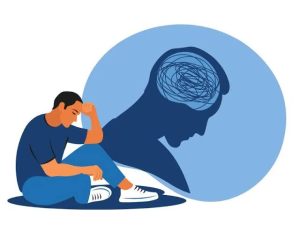Breaking the silence…
Mental health is a crucial component of overall well-being, yet it has long been an overlooked issue for men. For years, societal norms have reinforced the idea that men must be resilient, strong, and stoic—pressures that have contributed to the silence around men’s mental health struggles. This silence not only prevents men from seeking help but also perpetuates a harmful stigma that associates vulnerability with weakness. However, in recent years, the importance of mental health for men has begun to gain more attention, and initiatives are emerging to break down the barriers that discourage men from seeking support.
International Men’s Day is observed annually on 19 November to raise awareness about the importance of mental health for men.
This year’s theme, “Positive Male Role Models,” highlights the importance of fostering open conversations about men’s mental health and creating supportive environments in which men can thrive.
The Societal Pressures and Stigma
From an early age, boys are taught to avoid expressing vulnerability. Common phrases like “boys don’t cry” or “man up” reflect deep-rooted societal expectations that men must hide their emotions to maintain their masculinity. This mindset results in a distorted view of emotional expression, where feelings such as sadness, fear, and anxiety are often seen as signs of weakness. As a result, many men grow up suppressing their emotions, believing that asking for help is a sign of failure.

This cultural conditioning has profound consequences. Men are significantly less likely to seek mental health support, even when they are struggling with depression, anxiety, or other mental health issues. Instead, many turn to harmful coping mechanisms such as substance abuse, aggression, or even self-harm. Tragically, suicide rates among men are disproportionately high, with men accounting for around 75% of global suicides, according to the World Health Organization.
Breaking the Cycle: Shifting the Narrative
One of the key steps in addressing men’s mental health is challenging the stigma that surrounds it. Men need to understand that mental health struggles are not a sign of weakness but a natural part of the human experience. Just as physical health requires attention and care, so too does mental health. Ignoring mental health issues can have long-term and serious consequences, not only for individuals but also for their families, communities, and society at large.
The narrative surrounding masculinity must be shifted. Asking for help should be seen as an act of courage, not failure. Men must be encouraged to acknowledge and express their emotions, both in private and in public spaces. Normalising emotional expression, whether in the workplace or at home, is one of the most important ways to reduce the stigma surrounding men’s mental health.
Creating Safe Spaces for Dialogue
A critical element in breaking the silence about men’s mental health is creating safe, non-judgmental spaces where men can openly discuss their feelings. These spaces can range from mental health support groups to informal gatherings with close friends. When men feel they are in an environment where they won’t be shamed or ridiculed, they are more likely to open up and seek the support they need.

In the workplace, it is vital to cultivate a culture of understanding and support for mental health. Employers can take the lead by providing resources such as counseling services, mental health days, and fostering an open atmosphere where employees feel comfortable discussing mental well-being without fear of repercussion. When men feel that seeking help won’t lead to negative consequences, they are more likely to take the necessary steps to prioritize their mental health.
The Role of Public Figures and Role Models
Public figures, including celebrities, athletes, and leaders, can play a pivotal role in breaking down the stigma surrounding men’s mental health. When high-profile individuals openly share their struggles with mental health, it sends a powerful message that these issues are universal and affect everyone, regardless of their status, wealth, or strength.
Athletes like Kevin Love and DeMar DeRozan have used their platforms to speak candidly about their battles with anxiety and depression, encouraging other men to open up. Their openness has helped normalise conversations about mental health, especially in traditionally male-dominated spaces like sports.
Encouraging Early Intervention and Education
It is crucial to start the conversation about mental health early in life. Teaching boys that it’s okay to express their emotions and seek help when needed is key to changing the narrative surrounding masculinity. Schools, families, and communities all have a role to play in providing mental health education and promoting emotional literacy. By emphasizing the importance of emotional well-being from an early age, we can create a generation of men who are more comfortable addressing their mental health.
Furthermore, seeking therapy or counseling should not be reserved only for times of crisis. Mental health care should be viewed as a proactive tool for personal development, much like physical fitness. Encouraging men to view therapy as an essential part of maintaining emotional health can help normalize the practice and reduce the stigma associated with it.
Conclusion: A Call to Action
As we observe days like International Men’s Day, which highlights the importance of mental health for men, it’s clear that there is much work to be done to address this pressing issue. The silence surrounding men’s mental health is not something that can be solved overnight, but with collective action, we can begin to break the stigma. This means creating supportive environments, encouraging open dialogue, and dismantling harmful stereotypes.
If you are a man struggling with mental health, know that you are not alone. There is no shame in seeking help, whether that’s talking to a friend, reaching out to a therapist, or joining a support group. Taking the first step toward opening up is an act of bravery, and it can lead to healing.
For those who know a man struggling with mental health, offer a listening ear, check in regularly, and create a space where they feel comfortable expressing themselves. You may not have all the answers, but your support can make all the difference.
Ultimately, by breaking the silence and encouraging men to seek help, we can build a more compassionate and understanding world for everyone, regardless of gender. Let’s raise our voices and show men that it’s okay to not be okay.


